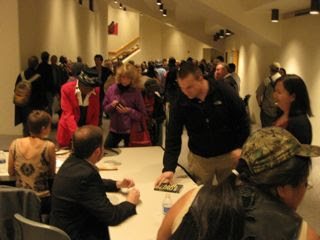And I couldn't find any information on when the exact amount would be announced. Today I called the Governor's office in Anchorage and they told me the date the amount will be announced is Tuesday, September 21.
As I said in the previous post, a July 31 ADN article predicted it would be pretty close to last year's $1,305 - between $1,250 and $1,320.
I would also note a comment from Anonymous in Ohio, who raised questions that I think are not uncommon from people Outside [Alaska jargon for everywhere not in Alaska.] So I'm including Anon's comment and my response here.
Anon:
As a resident of Ohio, which sends more money to the federal govt than it receives back in federal funding, I am interested to know why Alaska sits on a fund with $35 Billion in assets, pays its citizens a 3 figure dividend from that fund every year, even when the fund has negative earnings in the prior year, yet gets more than double in federal funding what it sends as tax revenue. Why doesn't Alaska use that $35 B to build infrastructure, improve schools, and provide basic services to the villages? Do Alaskans pay federal tax on their permanent fund dividend? I actually find it rather distasteful to learn Alaska is taking federal funding while divvying up $8M among its residents.
My response to Anon:
Anon from Ohio, answering your questions could take up a few whole posts. But just briefly,
1. The US Government owns 60% of the land in Alaska. So a lot of money that comes to Alaska is related to managing your land here in Alaska. This includes a mountain officially named after a favorite son from your state and which your Congress members refuse to allow to be changed back to the name given by the original Alaskans. (The key opponent, Rep. Regula retired in 2009, so maybe there's hope now.)
2. Alaska has a large military presence and a lot of the federal money goes to that.
3. Alaska only became a state in 1959. Ohio has had over 200 years of statehood and federal help to develop necessary infrastructure. We have lots of catching up to do.
Do we deserve all the money we get from the feds? I'm not sure, but there are unique and justifiable reasons why Alaska gets so much federal money.
Why shouldn't we use the permanent fund now? That's a reasonable question. It was set up on the grounds that the oil was not a renewable resource and that one generation of Alaskans shouldn't squander the wealth and leave nothing for future generations. The idea is that when the oil money runs out, there is a fund that has been saved, which the state can tap to help pay for government. I would call that prudent management.
However, many Alaskans have taken the dividend so for granted, that they would oppose allowing the fund to be tapped to run the government. But as oil revenue runs out, the dividends of the fund should be able to pay for a good portion of our expenses. It's like a trust fund for the state.
Don't get me wrong. You're asking legitimate questions, but I'm guessing, Anon in Ohio, if you lived here you would be collecting your annual check and not want to dip into the principal.











